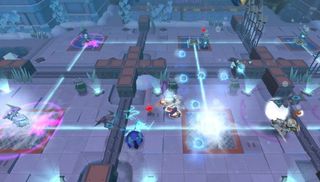Cosmetic item stores

Offering players ways to stand out is a lucrative business. In the Dota 2 Steam Workshop, item creators compete for audience upvotes and Valve's approval, and the successful ones have made a small fortune in the process. If you spend a lot of time in a game world with friends, cosmetic items like hats in Team Fortress 2, or new player skins in League of Legends, can set you apart without tipping the game's systems. At worst, new outfits can corrupt character silhouettes or dilute a game's aesthetic, making battlefields harder to parse at a glance, but this is a minor trade-off for a system that lets developers support themselves and keep games running.
Buying cosmetic items is also a very transparent, obvious transaction. Buy the item for the clearly labelled cost, get the item, it's yours until the game loses popularity and expires, or the heat death of the universe occurs. There's no trickery, the integrity of the game is maintained, and everyone gets a nice hat. Cosmetic items make money out of happy players who want to express their fandom, which makes every purchase positive.
In short: A straightforward, easily understood transaction that doesn't unbalance the game. Ideal.
Energy bar restrictions

Energy mechanics take various forms, whether action points that expire with every interaction or a continuously dwindling energy meter that stops you from playing when it expires. The crudest variations attempt to encourage the player to buy more energy at the point of expiration, oodling out a few bucks of the sheer frustration of having a game cut short. Subtler time limiting devices are designed to encourage "sessioning," in which players devote five or ten minutes of their time every day to tending to a garden/city. The intent here is to turn the game into a regular life fixture that increases the player's contact with other the monetisation mechanisms built into the game's economy.
Energy bar systems straightjacket players with arbitrary systems. You're not failing to progress because of a lack of skill, but because of the expiration of an invented abstract resource. Besides all that, the amount of time you choose to engage with a game should be your choice alone, and a pop-up message that says you're done unless you buy X or wait 12 hours just feels insulting. Sure, game demos will stop you when you're having fun and ask you to buy the full game, but players know the rules when they start the download. Energy mechanics, can be hard to spot until you've spent a certain amount of time playing. Very unpleasant.
In short: No no no no no no no no no.
Expiration

Expiration systems cause components of the game that you use regularly to wear out and break unless a certain amount of money is spent on repairs. In Fifa's Ultimate Team mode, players are benched if their contract expires, and you need to apply new contract cards to get them back on the pitch. These are dropped randomly in card packs that can be bought with in-game money or real money. If you pay for contract cards to support a player you bought through a card pack or on the transfer market then you're essentially paying ongoing rental costs for a virtual product you've already bought. Sometimes expiration is designed to drain your reserves of in-game currency. A game might ask you to spend in-game bucks on restoring expired items so that you run short, and might feel the need to top up with a real money purchase. In the worst cases, there are shooters that charge players for ammo to fill their guns, and even offer premium varieties of ammo to give them a battlefield edge.
The biggest gaming news, reviews and hardware deals
Keep up to date with the most important stories and the best deals, as picked by the PC Gamer team.
Being charged money to maintain the status quo earned through play is terrible, and can undermine any sense of achievement you may have enjoyed earning your gear. It creates a persistent, unpleasant pressure to pay and is an unsatisfactory purchase if you do cave. You know that you'll have to pay again to recharge that item/player/gun soon enough. Expiration creates that poisonous sense of being slowly nickel-and-dimed.
In short: A great way to annoy players fast. Watching items expire isn't fun, paying to stop them expiring isn't fun. Putting money into a game should feel rewarding; paying to stave off the entropic decay of your virtual possessions isn't.
Item rental

You could frame the renting of in-game items as a more transparent take on the expiration mechanic. In most cases you'll understand exactly how long you're getting an item, which can be tricky to ascertain in energy systems when you're buying an abstract resource that'll deplete as you play. The difficulty with rental items is that, in order for them to be desirable enough to purchase for a limited period, they need to be powerful. Need For Speed World let players rent blindingly fast supercars to take into races with ordinary cars, ruining the experience of the majority for the benefit of the paying few.
Even if a rented item isn't overpowered, the perception among players that it must be is almost as damaging. The same effect applies to any in-game item purchases. If there's a price tag attached, it's natural to assume that it's more powerful in some way, and if a competitive game doesn't feel balanced it quickly becomes more frustrating than fun. Also, the notion of paying for a virtual item is enough of a barrier for many, the idea of paying for one that'll disappear in a few days is even more absurd.
In short: If you're only intending to play for a short burst, a temporary item might be a cheaper option, but the cost of renting cars in games like Need For Speed World is surprisingly high. Rented items normally just aren't a good deal.
PC Gamer is the global authority on PC games—starting in 1993 with the magazine, and then in 2010 with this website you're currently reading. We have writers across the US, Canada, UK and Australia, who you can read about here.
Most Popular



